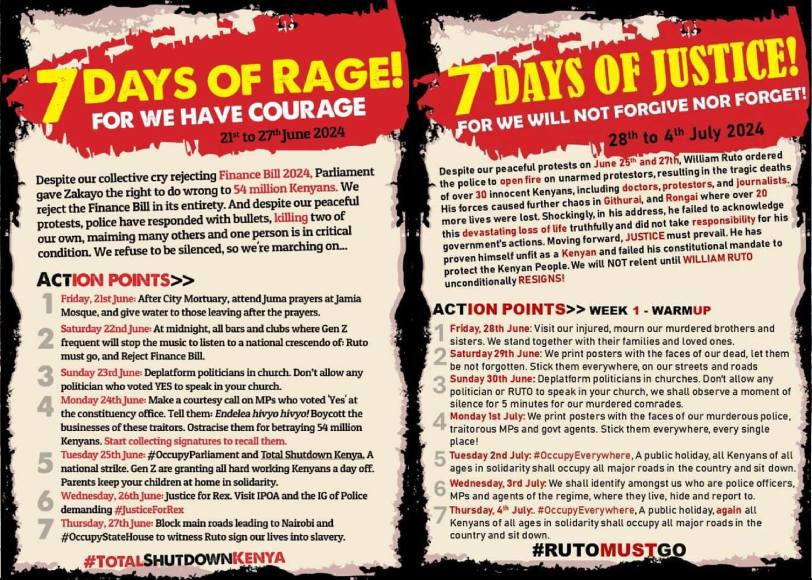El 23 de junio, millones de kenianos se movilizaron en todo el país contra la Ley de Finanzas 2024 que fue sancionada por el parlamento ese día. El gobierno desató una represión brutal pero no pudo sofocar las protestas. A la mañana siguiente, el presidente William Ruto tuvo que anunciar el retiro de la ley. Pero las protestas han continuado y ahora exigen la dimisión del presidente. Entrevistamos a un participante de las protestas y miembro de la Liga Socialista Revolucionaria, sección de la LIS en Kenia.
¿Qué provocó estas protestas?
Esto fue provocado por la corrupción rampante y desenfrenada y la arrogancia que este gobierno mostró a su pueblo. El rechazo de la ley de finanzas no fue el comienzo, fue el detonante de la ira acumulada por la corrupción y opresión que este gobierno y los anteriores ejercieron contra el pueblo. Ellos muestran una opulencia y extravagancia grotescas, con coches caros, relojes de millones de dólares y cinturones de 10.000 dólares. Y al mismo tiempo le dicen al pueblo que se tiene que ajustar el cinturón. Eso es lo que provocó estas protestas.
William Ruto es el quinto presidente de Kenia, que llegó al poder en 2022 con el Partido Alianza Democrática Unida, que también tiene mayoría parlamentaria. Por eso le resulta muy fácil aprobar proyectos de ley, porque los diputados son básicamente títeres suyos. Votan las leyes sin tomar en cuenta las opiniones de las personas que representan. La verdad es que, ahora mismo, lo están pasando muy mal. Cuando regresan a sus distritos electorales, los golpean en las calles y les han incendiado sus casas.
Ruto es lacayo de Occidente al igual que el anterior presidente, otro déspota, Kenyatta. En todo caso, es peor, un agente más directo del FMI y su agenda, y más abiertamente neoliberal. La Ley de Finanzas 2024 fue diseñada junto con el FMI y el Banco Mundial para aumentar todos los impuestos que paga la mayoría de los kenianos, con el fin de recaudar fondos para pagar la deuda externa. Esto fue claramente visto como otra forma de seguir exprimiendo a las masas empobrecidas y al mismo tiempo proteger la enorme riqueza de unos pocos empresarios y políticos corruptos, especialmente por parte de los jóvenes que encabezaron la protesta.
¿Cómo se organizaron estas protestas?
Fueron organizadas en internet por jóvenes coordinando en plataformas alternativas más seguras. Allí se hizo el llamado a los “siete días de rabia”, se diseñaron y difundieron los volantes y carteles y se organizaron las acciones. Ningún partido u ONG intervino en el asunto, aunque miembros de organizaciones revolucionarias como la nuestra desempeñan un papel importante.

¿Por qué siguen las protestas después de que Ruto anunciara el retiro del proyecto de ley de finanzas?
Lo que la gente fuera de Kenia debe saber es que el presidente es uno de los mayores mentirosos patológicos que existen. Hay un comunicado de prensa que dio el martes por la tarde, inmediatamente después de las protestas, en el que nos llamó criminales y traidores en un tono muy hostil, amenazando con intensificar la represión con los militares. Ese era el verdadero Ruto. Al día siguiente, dijo que concedía y que retiraría el proyecto de ley. Eso era para la comunidad internacional, dada la brutalidad que ocurrió la noche anterior. Pero aquí nadie le cree.
Por eso ya ni siquiera se trata de la ley de finanzas. Por eso organizamos una nueva semana de acciones, “siete días de justicia”, por los cientos de muertos, heridos, detenidos y desaparecidos de la semana anterior. Nuestra exigencia ahora es que Ruto renuncie y que los responsables de la represión sean ajusticiados. Tiene que haber una transformación total del gobierno. Y lo que estamos planeando nosotros es hacer es una transformación total del sistema.
¿Cuál es la perspectiva?
El gobierno ha dicho que creará un comité de diálogo nacional. Están tratando de sofocar la protesta, pero todavía no escuchan a la gente. Por eso las protestas continuarán. Estamos presionando por una huelga general además de las marchas y otras acciones, ya que ahí es donde reside el verdadero poder de los trabajadores.
El resultado es incierto, pero a esta altura, se gane o se pierda, lo que ya ha sucedido es muy importante para el pueblo de Kenia. Por primera vez en la historia, los jóvenes se han organizado, no en base a sus líneas tribales, que era la principal forma de organización política en Kenia. Por primera vez, es un reclamo el que ha unido al pueblo. Y esto facilitará la construcción de organizaciones como la RSL, porque la gente escuchará las propuestas que tenemos y las ideas que planteamos para mejorar la situación.
Personas como el presidente Ruto no fueron elegidas porque fueran los mejores candidatos, sino porque provienen de las tribus más grandes y sus aliados también provienen de las tribus más grandes. Esta nueva generación quiere que sus líderes rindan cuentas. Y creo que este cambio crea una oportunidad para las organizaciones que buscan sumar personas en base a las ideas. Entonces, incluso si esto no termina en un triunfo completo, creo que, en adelante, a organizaciones como RSL nos resultará más fácil construirnos. Todo el mundo está hablando de esto ahora.


